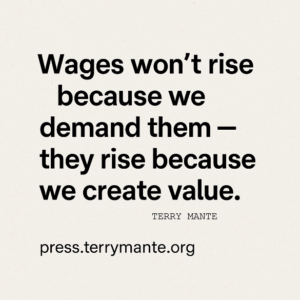It’s a conversation many avoid but feel every day — Ghanaian salaries are painfully low.
According to the Ghana Statistical Service, the average public sector worker earned about GH₵2,594 per month in 2022, rising slightly to GH₵2,922 in 2023.
In comparison, the average American worker earned around $65,470 annually — about GH₵720,000 — while even the lowest-paid EU countries like Bulgaria averaged over €13,500 a year. The gulf is staggering.
But here’s the obvious question: why?

The Hard Truth: Productivity Matters
Former Ghana President John Kufuor once remarked, “In Ghana, workers pretend to work and employers pretend to pay them.” It was harsh. It was bold. And it was absolutely true then — and remains true today.
Wages are not just handed out because people show up at work. Wages are a reflection of productivity. Organizations pay salaries out of the wealth their workforce creates. If productivity is low, so too are revenues — and therefore salaries. It’s that simple.
When a significant portion of the workforce is unproductive, organizations struggle to survive, let alone afford generous salaries. Output generates income. No output, no money.
Yet, in Ghana, across both public and private sectors, low productivity is a recurring theme.
A Culture of Mediocrity
Let’s look at real-life scenarios:
- Public Sector Realities: A visit to a typical government office often reveals a disturbing pattern — late arrivals, long breaks, minimal urgency. Citizens endure endless queues for basic services while employees appear unbothered.
- Private Sector Woes: Many employers privately confess: they must micromanage staff who resist initiative and settle for the bare minimum effort. It is not uncommon to find employees spending more time on social media than on assigned tasks.
- The Informal Sector Drag: In the sprawling informal economy, productivity is hampered by poor planning, lack of innovation, and a “good enough” attitude that stifles growth.
In each of these scenarios, low productivity directly stifles economic growth, and by extension, keeps salaries pitifully low.
Skills Gap and Structural Problems
The problem isn’t just attitude. Structural issues deepen the crisis:
- Education vs Employability: Too many graduates leave school with certificates but lack practical skills.
- Minimal Investment in Professional Growth: Organizations rarely invest in staff training, and workers themselves seldom seek to improve.
- Technological Backwardness: Lack of access to modern tools and systems means many sectors run on outdated, inefficient processes.
It becomes a vicious cycle: low skills → low productivity → low wages → low motivation → even lower productivity.
The Psychological Cost
Beyond the figures, there’s a silent psychological cost. Low wages breed resentment. Resentment breeds disengagement.
Disengagement kills productivity even further. It’s no wonder many workers treat jobs like burdens and view excellence as optional. It’s no wonder many employers treat workers like expenses, not assets.
But here’s the wake-up call: wages won’t rise by themselves. Salaries won’t increase just because we complain or demand it on social media. Salaries increase when value increases — when workers deliver results that justify better pay.
Rethinking the Ghanaian Work Ethic
If Ghana truly wants to raise living standards, it must address this elephant in the room:
- Rewire Attitudes: We must rebuild a culture where excellence, diligence, and integrity are non-negotiable at every level — from CEOs to janitors.
- Tie Pay to Output: Reward performance, not mere presence. Celebrate productivity, not just seniority.
- Upgrade Skills: Educational institutions must align their outputs with industry needs, and workers must commit to continuous learning.
- Leverage Technology: Embracing tech isn’t optional. It’s survival.
Simply put: more work must translate into more value. Only then can more money flow into the pockets of Ghanaian workers.
Hard Truths, Real Solutions
Low salaries are not a mystery. They are the visible symptoms of invisible failures — poor work ethic, low productivity, outdated mindsets. Until we collectively fix this, Ghana will remain trapped in the same cycle of poverty, frustration, and empty promises. Pretending to work while pretending to pay is no longer sustainable in a competitive global economy. The elephant is in the room — and it’s time we faced it head-on.
——Bottom of Form
About the author
Terry Mante is a thought leader whose expression as an author, corporate trainer, management consultant, and speaker provides challenge and inspiration to add value to organizations and position individuals to function effectively. He is the Principal Consultant of Terry Mante Exchange (TMX). Connect with him on LinkedIn, Facebook, X, Instagram, Threads and TikTok @terrymante and www.terrymante.org.










